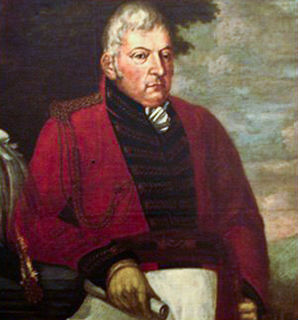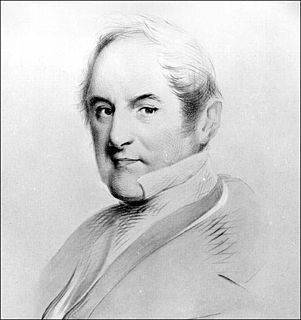 W
WGeneral Sir George Don was a senior British Army military officer and colonial governor during the late eighteenth and early nineteenth centuries. His service was conducted across Europe, but his most important work was in military and defensive organisation against the threat of French invasion during the French Revolutionary and Napoleonic Wars. Don was also frequently requested for advisory and espionage work by British generals and was once employed by the Prussian State as a spy. In 1799 he was arrested during a truce by Guillaume Brune who accused him of attempting to foment rebellion in the Batavian Republic and was not released until the Peace of Amiens. During and following the wars, Don also served as Lieutenant Governor of Jersey and Governor Gibraltar, implementing organizational reforms with much success in both places.
 W
WLieutenant-General Sir Robert Lawrence Dundas was a British Whig and military commander during the Peninsular War. He was a Member of Parliament in the House of Commons representing Malton from 1807–1812, East Retford from 1826–1827, and Richmond from 1828–1834 and from 1839–1841.
 W
WLieutenant-General Sir John Harvey, was a British Army officer and a lieutenant governor.
 W
WLieutenant-General Sir Percy Henry Noel Lake was a senior commander of the British Indian Army, serving during World War I, and a Canadian soldier.
 W
WCaptain Stephen Ponsonby Peacocke was a British officer of the Bombay Army and an artist notable for his 17 paintings of historic landscape views in the Nilgiri Hills in South India. Tinted lithographs were made of these views and published in imperial folio in London by the lithographer Paul Gauci in 1847. Peacocke's lithographs reflect the romantic escape to a temperate hilly area that all British people in the plains yearned for in those days. His career culminated as a member of the New Zealand Legislative Council from 1866 until his death in 1872.
 W
WSir Frederick Philipse Robinson, GCB was a soldier who fought for Britain during the American War of Independence. His father, Colonel Beverley Robinson, was a Virginian who moved to New York, marrying a wealthy heiress of the Philipse family with Dutch and Bohemian ancestry, Susanna Philipse. Frederick was born in the Hudson Highlands on the family estate in the Philipse Patent, today's Putnam County, New York, in September 1763.
 W
WMajor General Euston Henry Sartorius was a recipient of the Victoria Cross, the highest and most prestigious award for gallantry in the face of the enemy that can be awarded to British and Commonwealth forces. His brother Reginald was also awarded the VC.
 W
WSir James Matthew Stronge, 3rd Baronet DL, JP (25 November 1811 – 11 March 1885, succeeded to the baronetcy on the death of his 78-year-old father, Sir James Stronge 2nd baronet, on 2 December 1864. He was a member of the Stronge family and was born in Tynan Abbey, County Armagh. His mother was Isabella Calvert, Lady Stronge, the eldest daughter of Nicholas Calvert M.P., of Hunsdon House, Hertfordshire, and his wife The Hon. Frances Pery, daughter of the Viscount Pery.